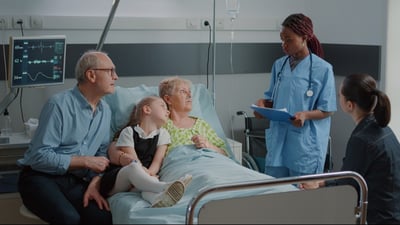Endometrial Cancer



Relevance: Medium-High
Most relevant for: People at high risk for hereditary cancer
Guideline: Hereditary cancer gene guidelines expand
The National Comprehensive Cancer Network regularly updates guidelines for several types of hereditary cancer. These recommendations often change when new research is published. Recently, the NCCN expanded its guidelines to include information on hereditary prostate and gastric cancers. (Posted 1/6/25)
Este artículo está disponible en español.
READ MORE ›


Relevance: Medium-High
Most relevant for: People with endometrial cancer
Update: News from the FDA: New endometrial cancer approvals
The FDA recently approved three new immunotherapy treatments (Jemperli, Imfinzi and Keytruda) for advanced endometrial cancer. (Posted 11/7/24)
Este artículo está disponible en español.
READ MORE ›


Relevance: Medium-High
Most relevant for: People with cancer interested in using cannabis to help manage symptoms.
Study: Use of cannabis for cancer symptom management
Among people with cancer, interest in the use of cannabis to manage cancer symptoms and treatment side effects is high. The world's leading professional organization of oncologists has published strategies to help adults with cancer and their healthcare providers have open, nonjudgmental discussions about the use of cannabis to manage cancer symptoms. (Posted 9/27/24)
Este artículo está disponible en español.
READ MORE ›


Relevance: Medium-High
Most relevant for: People with advanced endometrial cancer
Study: Managing the side effects of advanced endometrial cancer treatment
Immunotherapy plus targeted therapy is a treatment option for advanced endometrial cancer that has progressed after prior treatment. People who start the two-drug combination are more likely to have a positive experience if they learn about the possible side effects and when they might occur. The most common side effects and how to manage them are discussed in this review. (Posted 9/25/24)
Este artículo está disponible en español.
READ MORE ›


Relevance: High
Most relevant for: People diagnosed with cancer
Topic: Acupressure for cancer symptom relief
Acupressure is a safe treatment that can be used to relieve some symptoms of cancer and side effects of treatment. Light pressure applied to key points on the body may help with fatigue, sleep, nausea and possibly other symptoms as well. (Posted 8/1/24)
Este artículo está disponible en español.
READ MORE ›


Relevance: Medium-High
Most relevant for: People with advanced HER2-positive cancer
Topic: The drug Enhertu is FDA-approved for any advanced or metastatic HER2-positive tumors
The FDA granted accelerated approval of Enhertu for people with any HER2-positive tumor that is metastatic or cannot be surgically removed. Eligible patients must have had previous treatment such as chemotherapy or hormone therapy. (Posted 7/19/24)
Este artículo está disponible en español.
READ MORE ›


Relevance: Medium-High
Most relevant for: Cancer patients
Topic: Experts call for early palliative care for cancer patients
People with cancer need support and care not only at the end of life but from the time of diagnosis. At the 2024 American Society of Clinical Oncology (ASCO) annual meeting, the organization’s president urged cancer healthcare professionals to make palliative care central to cancer treatment. (Posted 7/17/24)
Este artículo está disponible en español.
READ MORE ›


Relevance: High
Most relevant for: People diagnosed with cancer who have not yet had genetic testing
Study: Genetic testing among people with cancer can find mutations that may affect treatment and prevention
Despite national guidelines recommending genetic testing, less than 10 percent of eligible patients had genetic testing within two years after their cancer diagnosis. Among those who had testing, 10-30 percent had an inherited mutation that could affect their medical care. (Posted 3/15/2024)
Este artículo está disponible en español.
READ MORE ›


Relevance: Medium-High
Most relevant for: People diagnosed with endometrial cancer
Study: Genes, genetic counseling and disparities in endometrial cancer
Endometrial cancer is on the rise, and it can run in families. Genetic counseling has benefits for people with cancer and their family members. However, Black women with endometrial cancer more often have worse outcomes than white women. Black women with endometrial cancer who test positive for an inherited mutation are less likely to see a genetic counselor. Given these disparities, Black women would benefit from better access to and referrals for genetic counseling. (Posted 12/14/23)
Este artículo está disponible en español.
READ MORE ›


Relevance: High
Most relevant for: People with advanced endometrial cancer
Study: Immunotherapy improves outcomes of advanced endometrial cancer
Standard treatment for advanced endometrial cancer may soon change. A study found that people with advanced or recurrent endometrial cancer who received immunotherapy with chemotherapy had better outcomes than those who had chemotherapy alone. (Posted 12/4/23)
Este artículo está disponible en español.
READ MORE ›